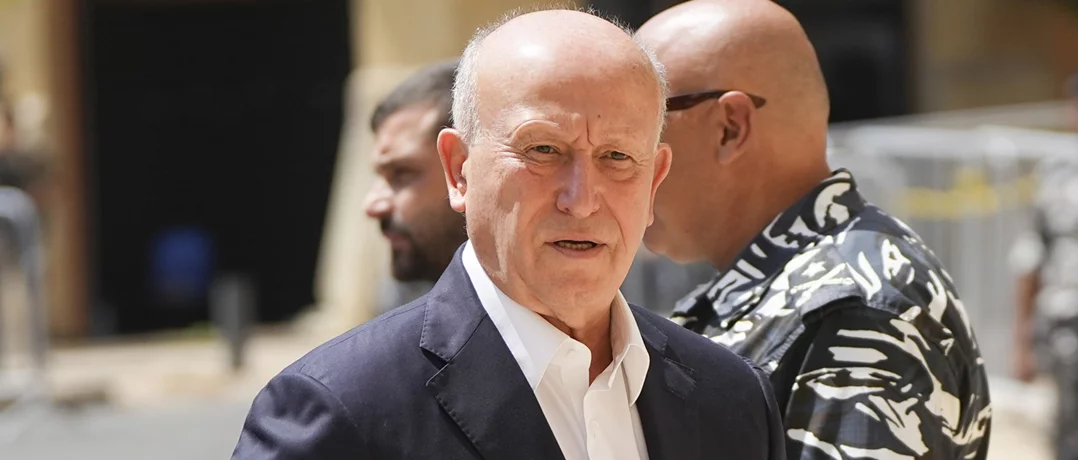Hezbollah's arsenal remains one of Lebanon's most pressing challenges. Far from being a purely internal affair, it has become a central component of the regional and international struggle for power.
Ashraf Rifi: Hezbollah’s weapons will be surrendered within months
Ashraf Rifi: Hezbollah’s weapons will be surrendered within months


In an exclusive interview with The Beiruter, MP and former ISF General Ashraf Rifi said Lebanon stands at a decisive crossroads. He argued that the justifications for Hezbollah’s weapons have collapsed, while shifting regional and international dynamics open the way for the state to reclaim full sovereignty.
Rifi outlined a roadmap starting with the handover of illegal arms and the restoration of Tripoli’s role in the national balance. He stressed that confining weapons to state institutions is “a distinctly Lebanese demand aimed at freeing the country from Iranian control,” adding that Hezbollah “serves Tehran’s interests, not Lebanon’s.”
Hezbollah’s weapons will be gone within months
Rifi called on Hezbollah leaders, now that Iran’s role in Lebanon and the region is waning, “to recognize reality and spare their people and [Shia] community further costs after their recent defeat, by handing their weapons over to the Lebanese state.”
Rifi was categorical: “Hezbollah’s weapons will be surrendered within a few months
He noted that while the process is not yet settled definitively, momentum is accelerating. The aura of legitimacy once granted to these weapons under the banner of resistance and with unrestricted passage through all crossings and checkpoints – “no longer exists. The situation has changed, and we are moving steadily toward normalcy.”
Israel does not justify Hezbollah’s weapons
Rifi underscored the need for Israel to withdraw from occupied Lebanese land and cease its violations. At the same time, he lamented that “the stronger party in international politics does not abide by law or international resolutions,” pointing out that Israel today “enjoys broad international cover.” But, he emphasized, “this reality does not justify Hezbollah occupying us on the ground as Israel occupies us from the skies.”
He accused Hezbollah of exploiting Israel’s violations to score points against Lebanon’s sovereign forces, saying its rhetoric serves only as “a pretext for keeping its weapons.”
The army’s plan: The only way forward
Rifi endorsed the Lebanese Army’s plan to control illegal arms, recalling that the decision had previously received the approval of Najib Mikati’s cabinet — of which Hezbollah was a part. “At the time, Hezbollah’s ministers endorsed the agreement with Israel,” he said. “Today, however, the party is stalling and playing for time. The duty of the Lebanese state, the president, and the current government is to implement the agreement and free the country from all illegal weapons.”
After Hariri: No single Sunni leadership
On the possibility of assuming Sunni leadership following former Prime Minister Saad Hariri’s withdrawal, Rifi emphasized that he carries a national cause, noting that “the Arab absence left the Sunni house unstructured, while Hezbollah’s abnormal dominance blocked any attempt to reorganize it.” He stressed that both Arabs and Western powers want Lebanon “to rid itself of Iranian occupation otherwise it will never find salvation.”
He added: “We fought with our flesh and blood to tell Iran that Lebanon is not yours to violate, nor can you transform it into an Iranian province. We endured, we resisted, and we faced down Iran’s project through an Islamic-Christian framework one that is now giving way in favor of the Lebanese state.”
On the Sunni scene, Rifi rejected the notion of a vacuum: “The community had multiple leaders before the late Rafik Hariri. With his arrival, leadership was unified positively. Today, the community has returned to plurality, and with time and the Arab world’s renewed engagement with Lebanon this leadership structure will grow faster.”
He insisted that Sunnis will not revert to one-man leadership: “That model only works with an exceptional figure like Rafik Hariri. In his absence, the natural path is toward multiple leaderships perhaps northern, Beirut-based, and Bekaa-based.”
Tripoli reclaims its national role
Rifi turned to Tripoli, affirming its status as “Lebanon’s second capital, home to the country’s second-largest national population.” He recalled how the city had been subjected to systematic demonization – first by the Syrian regime for rejecting its occupation and tutelage, and later by Hezbollah for rejecting Iranian hegemony.
He explained that the deliberate paralysis of Tripoli’s vital facilities President René Moawad Airport, the oil refinery, and the Rashid Karami International Fair – was the result of a Syrian-Iranian decision to punish the city for its political stance. Today, however, with the weakening of these external influences, Tripoli is reasserting its role.
Rifi revealed ongoing efforts to revive the refinery, launch contracts for Qlayaat Airport early next year, and further develop the port and Special Economic Zone.
“The people of Tripoli will soon feel the difference,” he said.
He added that he has placed himself at the disposal of newly elected municipal councils to follow up on central projects that could stimulate the city’s economy. “Our people deserve to live with dignity. They have the capabilities, the talent, and the will. Today we have climbed out of the hole and are walking firmly on solid ground.”
No election delay, no diaspora disenfranchisement
Rifi categorically ruled out any postponement of parliamentary elections, stressing that “the regional and international environment is too significant to allow such a delay.” He vowed that his political camp “will not permit any extension, despite the wishes of some who have outlived their time and dream of prolonging their terms.”
On the diaspora vote, Rifi rejected limiting expatriates to electing six MPs only. “They want money from the diaspora but deny them real political representation. We will not accept this. The diaspora must vote for all 128 MPs, as the law should be amended to guarantee. 69 MPs have already signed a petition to that effect, and though its implementation is being delayed, it will move forward.”
A new Syria: State-to-state relations
Addressing relations with Syria, Rifi denounced Hezbollah’s justification for retaining its arms under the pretext of combating “takfiris” along Lebanon’s eastern and northern borders. He said he had confronted Hezbollah MP Ali Fayad in Parliament, asking who exactly they meant by “takfiris” and whether that was a label for Sunnis. He rejected Hezbollah’s worldview, which, he said, paints Sunnis as extremists, Christians as Israeli collaborators and dissenting Shiites as foreign agents.
By contrast, Rifi noted, Syria’s new leadership has repeatedly declared it will not interfere in Lebanon’s internal affairs. He recalled President Sharaa’s statement that he had even pardoned Hezbollah, and affirmed a new approach of dealing with Lebanon on the basis of respect and sovereignty between two independent states.
Rifi concluded: “There is no personal cooperation or contact between me and Syria’s new leadership. I prefer state-to-state relations. The previous criminal regime treated Lebanon as part of Syria and ruled it directly. Today, there is a new order. May God guide the Syrian people in their choices, and may we succeed in ours on the basis of mutual respect and sovereignty.”
Rifi sets out a clear vision for Lebanon’s next phase: the restoration of full state sovereignty, the disarmament of Hezbollah, and the affirmation of the state as the sole legitimate authority over the use of force. Rejecting any postponement of elections or exclusion of the diaspora, he calls for inclusive Sunni leadership and positions Tripoli as a cornerstone of national renewal. For Rifi, Lebanon’s future can only be secured under the authority of the state free of illegal weapons and external domination.
But can Lebanon’s fractured political class and fragile institutions rise to meet this challenge?


